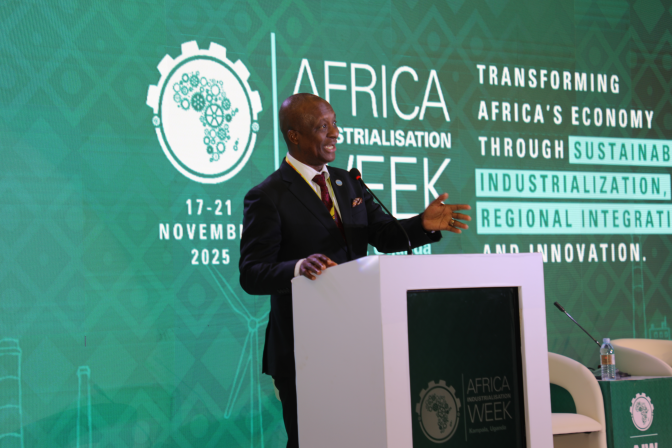KAMPALA, November 20, 2025 — The United Nations Industrial Development Organisation [UNIDO] Representative to the East African Community [EAC] and Mauritius, Stephen Kargbo, has urged African leaders to take charge of industrialisation efforts in their countries at a time of global uncertainty.
Kargbo delivered the message on Tuesday while addressing entrepreneurs, industrialists, women, and youth during the ongoing African Industrialisation Week 2025 [AIW2025] in Kampala. He stressed that for Africa’s industrialisation to succeed, countries on the continent must move forward together.
“As Africa, we have to reflect; we have to take leadership for our own industrialisation. Governments, private-sector leaders and regional institutions need to rethink the continent’s path towards sustainable growth,” he said.
While emphasising homegrown solutions, Kargbo also encouraged African nations to recognise their interdependence with the rest of the world as they shape their economic and industrial future.
“We will not be the only ones to solve our problems. It’s important that we take leadership not only in defining our solutions, but also in engaging with our partners—especially when negotiating contracts for our resources—so they truly benefit our people,” he added.
Structural transformation
Africa has long aspired to shift from low-tech economic activity to medium- and high-tech industrial production. Under the Sustainable Development Goals, least-developed countries are expected to double the share of manufacturing in their Gross Domestic Product, from 12 percent in 2015 to 24 percent by 2030.
“Today, we are at around 14 to 14.8 percent,” Kargbo noted. “That means the prognosis is gloomy. We must double our efforts. Even if we cannot fully double manufacturing’s share, there is still much more we can do.”
He underscored that Africa’s ability to create decent jobs, diversify exports, strengthen food security and withstand global shocks depends fundamentally on a competitive and sustainable industrial base.
The continent, he said, should leverage its abundant natural resources, youthful population and dynamic private sector—assets which remain underutilised in the absence of modern infrastructure, quality standards, coherent industrial policies and integrated markets.
The energy question in an AI future
Turning to the rise of artificial intelligence, Kargbo questioned how prepared Africa is for a digital future, reminding the audience that energy is the essential foundation for technological progress.
“How are we going to leapfrog to artificial intelligence [AI] if we don’t have sufficient energy to power data centres?” he asked.
He called for urgent attention to Africa’s chronic energy shortfalls, warning that “data centres are now among the world’s biggest consumers of energy. We must prepare for that reality.”
Kargbo also highlighted the critical role of Africa’s regional economic communities in driving industrial progress by strengthening regional value chains, promoting quality infrastructure, expanding agro-industry and supporting small and medium-sized enterprises.
He added that progress will also depend on developing enabling industrial policies, adopting green and digital technologies and building innovation ecosystems that support youth-led innovation—efforts that align closely with the African Union’s Action Plan for the Accelerated Industrial Development of Africa, aimed at propelling the continent towards a more competitive, sustainable and technologically ready future.
https://thecooperator.news/aiw-2025-opens-with-call-for-affordable-investment-capital/
Buy your copy of thecooperator magazine from one of our country-wide vending points or an e-copy on emag.thecooperator.news
